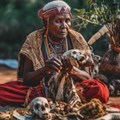Draft regulations for the registration of traditional health practitioners

“Since our appointment by former Health Minister Dr Joe Phaahla on 13 April 2023, our priority task was to see the implementation of the Traditional Health Practitioners Act 2007(Act No. 22 of 2007) realised,” the Interim Traditional Health Practitioners Council of South Africa (ITHPCSA) said in a statement.
The draft regulations published on 21 June 2024 in a Government Gazette outlines the processes which traditional health practitioners should follow in registering with the Council.
They provide the details of who qualifies to register with the Council, categories covered by the Act, registration forms, and the fees to be paid by THPs when registering with the interim council.
“It is our goal and commitment that at the proclamation of this draft regulations, all systems for registration of THPs will begin, ushering a new dawn for the recognition and professionalisation of the traditional health practice.”
The review of the draft Traditional Medicine Regulation 2015 was among the tasks the council addressed, which was submitted to the Minister for publication for public comment.
“We invite all interested persons and stakeholders within and outside the sector to submit any substantiated comments or representations on the proposed draft regulations. We also intend to provide contact consultations in all provinces to stakeholders within the sector to provide clarity where there are confusions.”
This consultation will, according to the Council, be scheduled within the months stipulated in the Gazette to offer people an opportunity to submit their comments.
The ITHPCSA was established to regulate THPs the same way other health practitioners are regulated by Councils such as the Nursing Council of South Africa (NCSA), the Pharmacy Council of South Africa (PCSA) and the Health Professions Council of South Africa (HPCSA).
“The interim Council is looking forward to constructive discussions with stakeholders and inputs from the public at large.”
Source: SAnews.gov.za
SAnews.gov.za is a South African government news service, published by the Government Communication and Information System (GCIS). SAnews.gov.za (formerly BuaNews) was established to provide quick and easy access to articles and feature stories aimed at keeping the public informed about the implementation of government mandates.
Go to: http://www.sanews.gov.za



















